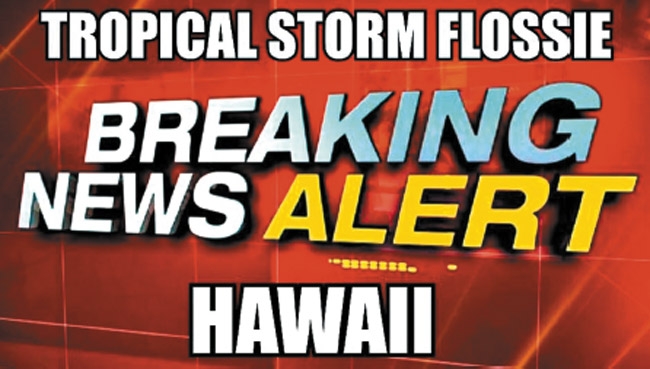Overblown TV Storm Coverage
This should have been said or written a long time ago: Our TV news stations must stop scaring the hell out of us every time some wind and rain approach the Islands.
The Boy Who Cried Wolf is coming into play.
How and why did this play-it-for-all-it’s-worth come to be? We used to make do very nicely 350 out of 365 days with a newscaster telling us in 15-20 seconds “mostly sunny tomorrow, some windward and mauka showers. Trades 10-20 miles per hour.”
But then came those Mainland TV news consultants. The ones who said any TV news marketing anywhere required identical remakes. Usually to change the name to “Eyewitness News” or something similar, and always to ramp up a major weather-reporting operation with the latest gizmos.” “But our weather is mostly benign and when it’s not we can move it higher in the newscast,” we traditionalists complained. “We can use the money for things we don’t do – like covering the Neighbor Islands.”
The station owners bought into the consultants’ side. So my KGMB (renamed Newsroom 9) would sign on with Accuweather. Unfortunately, that outfit predicted Hurricane Iniki to hit Waikiki instead of Kauai. Imagine the panic among tourists!
Later, the station would become “Hawaii’s Severe Weather Station.” Aren’t all broadcast licensees severe weather stations?
Then came the specialized weather-casters and all the gadgets to make air mass move, recreate rainfall, and more time devoted to weather as a principal part of newscasts. Of course, 350 of our days remained “mostly sunny with windward and mauka showers.”
But they’ve perfected the art of scaring people into Walmart until the toilet paper is gone. How much toilet paper does one person need to survive a wind-storm?
Motorists line up at filling stations. How much gasoline do you need on any islands to drive to a grocery store or shelter?
Flossie got ridiculous. We had the Water Board chief talking about conservation measures long after Flossie was no longer a storm.
Here are some suggestions for news directors to clean up their circus acts:
* Don’t have your people doing repetitive “live” reports from the islands until you’re sure it’s a damaging storm and will come ashore in another day.
* Dump all that stuff about “people are on a shopping spree to buy generators and supplies” unless we’re facing a known hurricane that won’t likely poop out.
* “Live” reports should be banned from inside Civil Defense operating centers. Having background people hustling back and forth just adds to the anxiety and sense of doom. Do the interviews outside.
* Tone down the descriptive language. Stick to what the National Weather Service is saying.
These storms that fizzle are great practice runs for Civil Defense, fire and police. TV shouldn’t be using them as practice runs for the day the world comes to an end. Reporters will run out of alarming words they haven’t used before.






